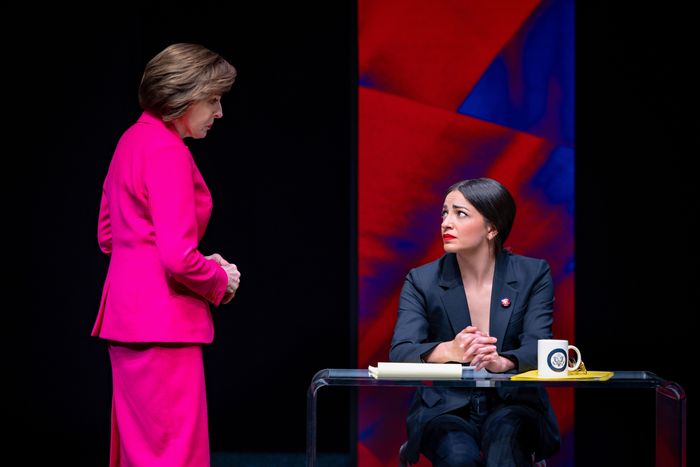The Off-Broadway Theatre Review: Mario Correa’s N/A
By Ross
“We aren’t here to talk about him,” N states pretty early on in Mario Correa’s new play N/A which recently had its world premiere at the Mitzi E. Newhouse Theater at Lincoln Center. And we all breathe somewhat a sigh of relief, even though my viewing of this playfully fascinating play winds its way forward through time, starting out with these two characters’ first meeting. It happens soon after the younger woman named A surprises them all by winning her primary against an established politician. A, to no one’s surprise, basically stands for Alexandria Ocasio-Cortez, or the AOC, as I like to call her. The other, N, stands for Nancy Pelosi, although don’t quote me, as those names don’t appear anywhere in the program or the press release.
What Correa (Tail! Spin!; Commander) does tell us quite quickly is that this play, written with a wit and a wink, is about the clashing of two types of liberals; the old guard and the new green. It’s preaching to the choir, though, on both sides of that L-word and for the crowd that has assembled at the Lincoln Center, we are all game to hear both sides.
Directed with a straightforward, somewhat loose easy by Diane Paulus (Broadway’s Jagged Little Pill), N/A dives in with both hearts fully exposed. Holland Taylor (Broadway’s Ann; The Front Page) as N revels in the part, giving us a masterclass of comic timing and sharp wit. Her character has been gifted quite generously with many of the stand-up comedy zingers, flung out with ease and clarity by an actress who’s relishing the experience. She’s a well-crafted machine, echoing her part’s strength of character and determination in all the ways it blesses and bruises her.

Ana Villafañe (“Castro’s Daughter“; UK’s Sinatra the Musical) as A isn’t given as much froth and fun to play with. You see the anger that leads her forward, coming off as less fun, for a good reason. It’s somewhat clear that this is the side where Correa’s heart truly lies (or is it?), but like our own sensibilities, it flies back and forth with almost every point made by both. The fencing match is almost always off-balance, with the older more experienced guard winning pragmatic points in abundance against the idealistic and less experienced Representative from Queens and the Bronx. And definitely don’t forget the Bronx, we are told.
But the framework is sharp enough to know that a shift is coming, and it happens with a somewhat overly dynamic departure from the one-on-one battle that has been laid out before us, with set and costumes designed by Myung Hee Cho (Shakespeare in the Park’s Richard III), with lighting by Mextly Couzin (Off-Broadway’s JOB), sound design by composer Sun Hee Kill alongside German Martínez, and projection design by ‘Possible’, taking on the charge with a non-fussy approach. “Change takes courage”, we are told, and the shifting of perspectives happens with almost every line. Whether pleased or disappointed, they are here to talk, even if not about him. They have come together to let us understand what’s at stake in our country, and give us some hope that these two ideals might find a way to come together, in a way that is needed even more today than back then.
Watching this fresh off last night’s debate (and posting this one day after the Supreme Court’s treacherous ruling), the clickity-clack of the work feels as fresh and as forced as it needs to be, even if we would like some theatrical relief from the world of politics. They fling slogans and formulations at one another within the clever text, sometimes feeling forced but also feeling true, and wickedly funny. It’s lopsided, this act that is both serious to A and to the world, and to the comedically enhanced N. Past triggers and memories of what has changed (and not) within those walls of the U.S. House of Representatives where this play takes place fill out the framing, trying to give it a bit more human alignment, and it does level out after the storm, but the play, in the end, after scoring fairly well for Holland, remains a teeter-totter of an ideal, where two women who orbit one another throughout never really find their way to come together. But these two actors certainly find their way into our conscious collective hearts.


